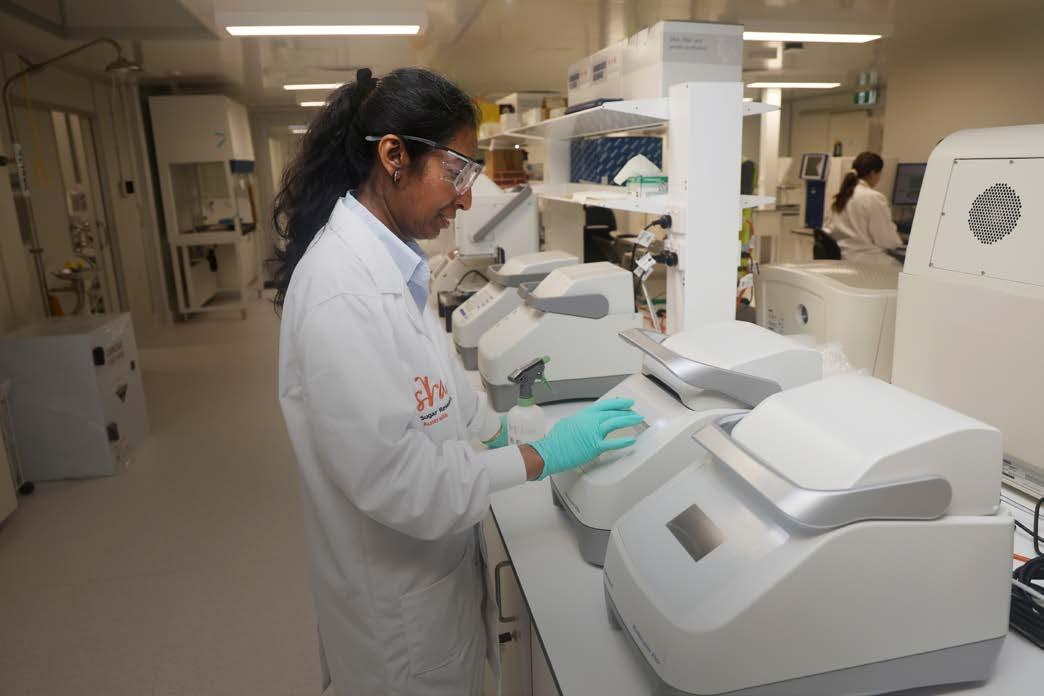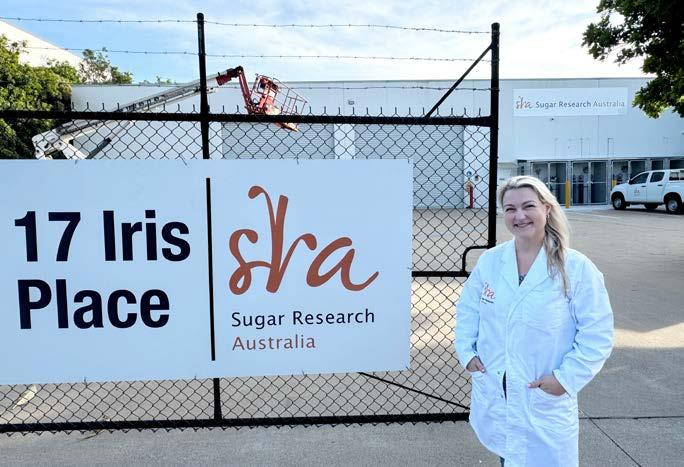
4 minute read
Iris Laboratories: The Beating Heart of SRA
SUPPLIED BY SUGAR RESEARCH AUSTRALIA (SRA)
Busy sugarcane growers working in the districts may only know SRA’s laboratory services in Brisbane for RSD testing, with about 12,000 RSD samples analysed for the sugarcane industry each year.
“We think of SRA’s laboratories as the organisation’s beating heart,” Head of Laboratory Services Dr Heidi du Clou said with a smile. “They play a central role in every process in the production of sugar – from growing seedlings in the nursery, through to determining cane quality in the mill.
“SRA laboratories are providing essential services to the industry on a daily basis – from the analysis of soil nutrients, studying the genetic traits of varieties, identifying pests and diseases, to analysing agricultural chemicals in plants and soils, determining components of runoff, and nutrient status of plants and mill byproducts,” Dr du Clou said.
“It is not just the grower who benefits but also the miller; SRA has developed calibrations for benchtop Near Infrared (NIR) instruments which are used in mill labs to measure multiple mill products in a fraction of the time compared to traditional methods,” she said.
“An online NIR instrument has also been calibrated to determine the losses of sucrose to mill mud in near real-time.”
Dr du Clou explained that SRA’s laboratories supported the advancement of these technologies and continue to do so following the move from Indooroopilly to Acacia Ridge. Now known as the Innovative Research & Industry Services Laboratories (IRIS), SRA continues to offer a large range of services in the fit-for-purpose premises.
RSD
Using quantitative polymerase chain reaction (qPCR), the laboratory provides Ratoon Stunting Disease (RSD) diagnoses to Productivity Services bodies and focuses on sugarcane xylem sap and leaf sheath biopsy samples. The lab carries out RSD testing on leaf tissue, stalk core tissue and extracted DNA for research purposes.
Quarantine
Domestically, SRA Quarantine facilitates the movement of plants from SRA’s variety development program in and out of sugarcane biosecurity zones, and also facilitates the import of foreign germplasm for variety development.
Plants are quarantined in a government facility in Victoria, during which SRA performs testing for several exotic and endemic diseases. Once released, the new clones are grown, multiplied through tissue culture and distributed to variety development to be used as parents.
Genomics (DNA analysis)
Sugarcane identity (DNA) tests are conducted where the laboratory uses disease-associated molecular markers to aid early selection of resistant varieties and Single Nucleotide Polymorphism (SNP) genotypic data which is generated and analysed to support genomic selection.
Tissue Culture
The team in the Tissue Culture laboratory supports industry by supplying commercial sugarcane varieties as clean disease-free seedlings to help manage serious diseases that are spread by seed cane.
Pathology
Molecular pathology helps the industry by improving diagnostic tools for domestic and exotic pathogens.
It works closely with the RSD testing and quarantine functions and provides molecular diagnosis of many diseases where required. It also aims to incorporate molecular techniques into variety screening methods.
Science & Genetics
The Cytogenetic Lab uses its own pioneering method to decode the complete chromosome set of sugarcane cultivars and determine their species’ origins. This knowledge supports variety development by guiding breeders in creating improved cultivars.
The cytogenetic contributions played a key role in a breakthrough that underpins research to develop enhanced varieties for the industry. The lab also offers international services, advancing global understanding of sugarcane genetics.
Chemistry
The Chemistry labs provide a suite of analyses to support R&D projects for stakeholders, and services to growers and millers:
Nutrition (soil, plant and water)
The labs are equipped with high-end instrumentation and highly skilled staff, with significant expertise in the analysis and interpretation of products specific to the Australian sugarcane industry. Researchers, Productivity Services groups and growers send samples to our laboratories which are accredited for nutrient analysis by the Australasian Soil and Plant Analysis Council (ASPAC).
Analytical Chemistry
The development of NIR was supported through the wet chemistry analysis of grower soils, sugarcane, and all mill products to build and maintain NIR calibrations.
Sugar Quality
The SRA breeding program is supported by analysis of quality variables in sugarcane clones. Various analyses are also provided to measure impurities in milling streams.
SPIDNET
The internal SRA database, SPIDNet, is used by Variety Development as a tool for efficient data storage and retrieval. It streamlines processes for all users, for better outcomes for the sugarcane industry. SPIDNet is now expanding to other disciplines.

For more information about the new IRIS Laboratories or if you are interested in visiting, please email SRA@sugarresearch.com.au
Dr Heidi du Clou stands at the entrance gate to IRIS Laboratories at Acacia Ridge






